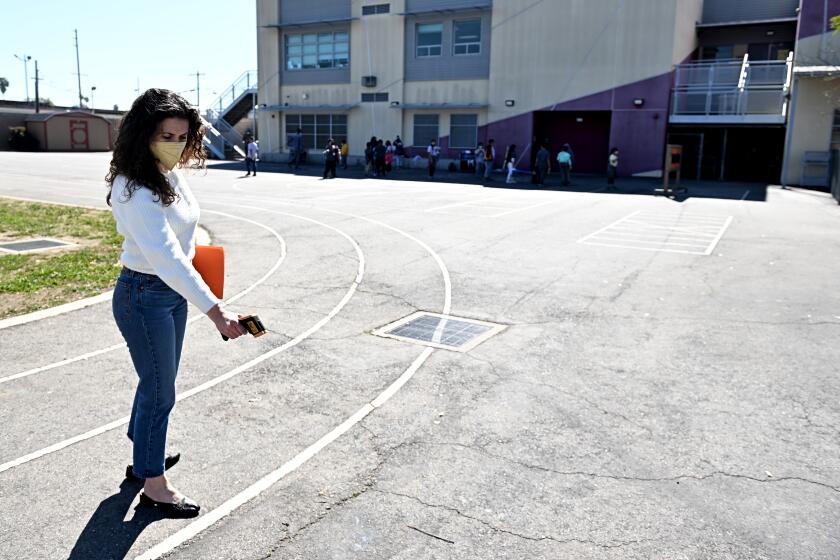Endorsement: Yes on Proposition 2 to repair California’s many dilapidated schools

- Share via
Thousands of California schools are in disrepair, waiting on critical upgrades to classrooms, roofs, plumbing and air-conditioning systems. But the state’s school repair fund is running out of money.
Proposition 2 on the Nov. 5 ballot would authorize the state to issue a $10-billion bond to modernize, renovate and repair public schools, as well as community college campuses. Of the money, $8.5 billion would go toward TK-12 schools while community colleges would get $1.5 billion.
Voters should support this well-crafted measure to invest in California schools. It would modernize classrooms and campuses, many of which have gone for so long without upgrades and repairs that they could charitably be called neglected, if not run-down.
From the top of the ticket to local ballot measures, California voters this year are grappling with major decisions that will shape their lives and communities for years to come.
Kids deserve a safe and healthy learning environment and California voters, who four years ago rejected Proposition 13, a much-needed $15-billion school facilities bond, owe it to current and future generations of California students to say yes this time. Unlike other states, California has no dedicated source of funding for school repairs and must periodically ask voters to replenish the coffers with bond measures.
The last voter-approved school bond was in 2016, and the $9 billion it provided has already been spent or claimed. There’s a growing backlog of more than $3 billion of school projects currently awaiting funding, about half of which are in the Los Angeles area.
It’s concerning that LAUSD rushed this big bond measure to the ballot, but the reality is the district’s schools have many renovation and modernization needs.
It’s not clear why voters rejected Proposition 13 in 2020, but Proposition 2 doesn’t include the same provisions about raising local bond caps that prompted concerns about higher property taxes or a funding formula that stoked opposition from some school districts.
Although most of the Proposition 2 money is earmarked for renovations and upgrades, some will also go toward new construction, including replacing dilapidated buildings on existing campuses. To receive state bond funds, districts have to put up their own money, often through local bonds, and apply for matching funds from the state. But it’s done on a sliding scale that provides a higher match to small or low-income districts that aren’t able to generate as much local bond money.
Voters should pick the four incumbents. They haven’t done a perfect job, but they are on top of the issues and speak intelligently about where the board has succeeded and what it still needs to do.
Proposition 2 wisely allows funding matches for climate-friendly projects such as schoolyard greening projects to remove asphalt, increase shade and keep students safe from the heat. It dedicates more than $100 million to remove lead from drinking water.
The bond includes money for career technical education centers and charter schools, and provides extra funding to build or renovate classrooms to be used for transitional kindergarten, an important investment as the state gradually expands TK to make it available to all 4-year-olds.
California’s workers are struggling. Proposition 32 would give about 2 million of the state’s lowest-paid workers a modest pay raise.
There is no question of the need and demand for these projects. Between the existing backlog and the roughly $1.5 billion in applications submitted to the state each year, proponents expect that most of the Proposition 2 money would be claimed by 2028.
Los Angeles Unified School District, which put its own $9-billion bond on the Nov. 5 ballot, is one of more than 260 school and community college districts that are asking voters to approve bonds that will help them access state money under Proposition 2. LAUSD expects to receive about $700 million.
Opponents include Assemblyman Bill Essayli (R-Corona) and former San Diego City Councilmember Carl DeMaio, a Republican who is currently running for Assembly. The Howard Jarvis Taxpayers Assn. argues that, though the money is paid back through the state’s general fund, it will lead, indirectly, to local property tax hikes as school districts place their own bonds on the ballot to secure matching funds from the state.
But it has much broader and bipartisan support. Proposition 2 is endorsed by both the California Democratic and Republican parties and by the California Teachers Assn., the California Building Industry Assn. and the Coalition for Adequate School Housing.
That’s not surprising. It is a cleaner, leaner and all-around better bond proposal than the one on the March 2020 primary ballot. It will help put California schools on the right track, and voters should approve it.
More to Read
A cure for the common opinion
Get thought-provoking perspectives with our weekly newsletter.
You may occasionally receive promotional content from the Los Angeles Times.














